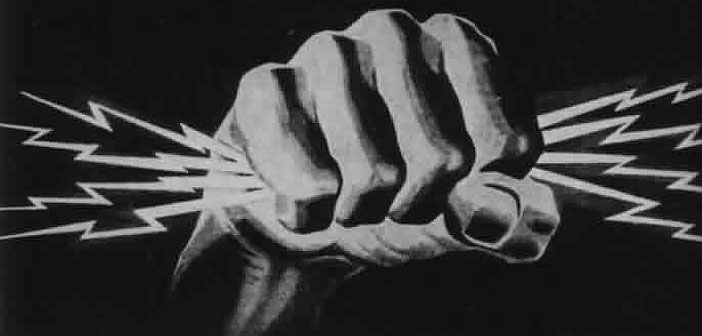The 1960s show what the optimistic spirit of a generation can achieve.
Share: The Guardian
In 1967, George Harrison was given a document by Vishnudevananda Saraswati, a founder of one of the first yoga teaching programmes in the west and the person who introduced the discipline to the Beatles. Titled Planet Earth Passport No. 1053, it read that its “bearer was randomly born on Earth in Liverpool”. It is displayed in the Victoria and Albert Museum’s latest exhibition You Say You Want a Revolution? Records and Rebels 1966-70. He was a showman, said to have piloted his two-seater plane into the airspace of global troublespots armed with only invalid documentation and a payload of flowers and peace leaflets.What could be a more emblematic cliche of the late 1960s than this image of a petal-bombing Yogi spreading his message of peace and love, and declaring that the world would be better as one? John Lennon, perhaps, with his anthemic summing up of the era’s naive optimism: “imagine there’s no countries … ”
I was 11 and living in Stuttgart when the period covered by our exhibition began. Society prior to 1966 would be unrecognisable to many today: homosexuality and abortion were illegal in the UK, you could be hanged for murder, a woman had to be married to get the pill, divorce was rarely granted and yet LSD was legal.
By 1970, just 1,826 days later, revolutions around the world had shaken the foundations of post-second world war society. Seismic societal changes were set in train that went on to shape the world we live in today. Civil rights, environmentalism, feminism, multiculturalism, gay liberation and even personal computing and the internet all have their roots in an era too easily caricatured for its psychedelic aesthetics, flowers, free love and nudity.
For a German born in 1955, the era had a heightened significance. West Germany was in a period of turmoil, and as the countercultural movement reached us, my contemporaries sought to find out more about the role of their parents’ generation in the Nazi era. I remember the dawning realisation that the world presented by our media was only one view, and as we called the actions and policies of government into question, a new climate of debate was born as “de-Nazification” reached a climax. Emancipation, environmentalism and grassroots democracy were discussed openly in a way that simply had not happened before. With the knowledge of how those of our parents’ generation had acted (or had failed to act), we could only look forward.
At 14 I myself attended an anti-Vietnam demonstration (getting in trouble with school in the process) and later in the 1970s I – along with friends – stood in court to convince the authorities of my credibility as a conscientious objector. Even then an atmosphere of control and hatred still lingered, reaching out from the past. This only encouraged us to unite around a wholly new spirit; we believed that we could, should and would change the world.
Look at today’s geopolitics and it is clear we have not yet succeeded.
While the impact of 1960s fashion, music and style on today’s culture and aesthetics cannot be denied, global politics apparently has little in common with its values; instead being reminiscent of a far darker time. Populists with frenzied and divisive rhetoric peddle fear and seed disinformation, seemingly taking inspiration from 1930s paranoia rather than the “open mind” that 1960s utopian thinking proposed. Brexit is a consequence, but there will be others as this “me-first” nationalist mentality spreads.
A characteristic of the time that today’s leaders do honour, however, is disobedience. We broke the rules, provoked and behaved badly en masse in pursuit of a greater good. I would wager that Donald Trump and his loud, angry supporters believe they are doing exactly that.
Furthermore, they are using a networked world to drive forward their cause. In 1964 novelist Alexander Trocchi prefigured the internet in his Sigma statements, which demanded that millions link together to create a universal university of knowledge, and the late 60s were full of dreams of a future liberated by advanced telecommunication. One such dreamer was Steve Jobs, who told the graduating class at Stanford University in 2005, “The Whole Earth Catalog [also in our exhibition and published regularly from 1968–72]… was one of the bibles of my generation. … It was sort of like Google in paperback form, 35 years before Google came along: it was idealistic, and overflowing with neat tools and great notions.”
Thanks in part to Jobs and other west coast hippies, a networked world has arrived, albeit one that can hardly be described as liberating. We are connected across boundaries like never before, yet many use these extraordinary tools simply to amplify our differences, to gang up on dissent, to attack expertise and to devalue true debate and dialogue. The same systems that allow us to connect across the globe, regardless of physical location, are responsible for surveillance culture and the dark web.
The tools for the “one world” that Vishnudevananda Saraswati, Lennon and a host of other hippies fantasised about are in our hands. But they are also brilliantly utilised by those with agendas that diametrically oppose the revolutionary optimism of the 1960s. Those who watched fascism rise in the early 20th century did not have the opportunity to connect and mobilise. As nationalism stirs again, we do.
The majority of those leading (or aspiring to lead) the world’s great nations came of age as the rebellion and revolution of 1966-70 were in full swing. They have witnessed what the optimistic spirit of a generation can achieve. Our world today cannot afford to only find those values in museums.

